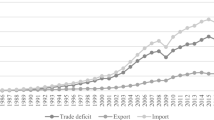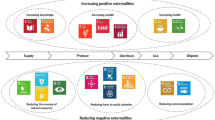Abstract
The switch from demand management to “supply-side economics” advocated in some industrial countries is also colouring development policy. The measures perceived to be right for the industrial nations are being urged on the developing countries and they are also to serve as new criteria for the granting of development aid. More of the available aid is to go to those countries that embrace the market economy and declare themselves ready to abide by the prescriptions of supply-side economics. However, as Prof. Sautter points out, it is highly doubtful whether the socio-cultural conditions for a successful supply-oriented policy are present in developing countries or can be significantly improved by implementing the usual supply-side proposals.
Similar content being viewed by others
References
Cf. Otmar issing: Erfolgsbedingungen einer angebotsorientierten Wirtschaftspoltik, in: Horst Sieber: (ed.): Persbektiven der deutsenen Wirtschaftspoltik, Stuttgart 1983, pp. 179–190
As in irving Kristol: Ideology and Supply-side Economics. Commentary, April 1981, reprinted in: Economic Impact, No. 35, 1981/ 3, pp. 30–35, here p. 32.
Adam Smith: Inquiry into the Nature and Causes of the Wealth of Nations, 1776, Book I, Chapter X, Part. 2.
Adam Smith. The Theory of Moral Sentiments, 1759
As demonstrated by, inter ala, A. L. MacFie: The Individual in Society, London 1967: see in carticular pp. 59–81
See in this connection Erich Streißler: Kritik des neoklassischen Gleichgewichtsansatzes als Rechtfertigung marktwirtschaftlicher Ordnungen, in: Erich Streißler, Christian Watrin (eds.): Zur Theorie marktwirtschaftlicher Ordnungen, Tübingen 1980, pp. 30–69.
A. L. MacFie, op. cit. The Individual in Society, London 1967: seen in carticular pp. 106 ff Alexander Rüstow also speaks of a “neo-stoicism” in: Das Versager des Wirtsonafts iberalismus, 2nd edition, Düsseldorf 1950.
Cf. Ronald Clapham: Marktwirtschaft in Entwicklungsländem, Freiburg 1973.
With reference to the passage that follows of. Martin Gester: Kokain allein genügt den Schmugglern nicht, in: Frankfurter Allgemeine Zeitung, 17. 3. 82; Geld gefährlicher als Guerilla, loc. cit. As in Irving Kristol: Ideology and Supply-side Economics. Commentary, April 1981, reprinted in: Economic Impact, No. 35, 1981/3, pp. 30–35, here p. 32. 3. 3. 83.
Cf. Wilhelm Röpke: Jenseits von Angebot und Nachfrage, Erlenbach-Zürich-Stuttgart 1958, 4th edition 1966; and: Civitas Humana, Erlenbach-Zürich 1944, 3rd edition 1949.
Alexander Rüstow: Das Versagen des Wirtschaftsliberalismus, op. cit. Das Versagen des Wirtschafts Iberalismus 2nd edition, Düsseldorf 1950, and Ortsbestimmung der Gegenwart, (3 parts), Erlenbach-Zürich 1950, 1952, 1957.
See in this connection Karla Krause, Helmut Heinzimeir: Der Zyklus der Zeit und die Spur der Multis, in: Frankfurter Allgemeine Zeitung, 30. 7. 83.
The programme of supply-side economics is not to be interpreted as a return to a pure aissez-faire liberalism (of Irving Kristol, op. cit.), As in Irving Kristol: Ideology and Supply-side Economics. Commentary, April 1981, reprinted in: Economic Impact, No. 35, 1981/3, pp. 30–35, here p. 32.
David C. McClelland: The Achieving Society, Princeton, N.J., 1961.
George Gllaor Wealth and Poverty New York 1981, p. 118.
Keaneth E. Boulding: The Economy of Love and Fear, Belmont, Calif, 1973.
Heino Flassbeck: Was ist Angebotspolitik? in: Konjunkturpolitik, 1982, pp. 75–138, here p. 87.
Joseph A. Schumpeter: Theory of Economic Development, 1912.
Theodor Heuss: Robert Bosch, Leben und Leistung. Stuttgart (no year), p. 60.
Joseph A. Schumoeter: Theory of Economic Development, op. cit. Joseph A. Schumpeter: Theory of Economic Development, 1912.
ibid. Joseph A. Schumpeter: Theory of Economic Development, 1912.
Josef A. Schumpeter: Capitalism, Socialism and Democracy, 1942.
Max Weber: Die protestantische Ethik und der Geist des Kapitalismus, 1905; Die protestantischen Sekten und der Geist des Kapitalismus, 1920; Die Entfaltung der kapitalistischen Gesinnung, 1923; reprinted in: Max Weber: Die protestantische Ethik, eine Aufsatzsammlung, published by Johannes Winckelmann, 2nd edition, Munich and Hamburg 1969.
A. O. Hirschman: The Strategy of Economic Development, Stuttgart 1967, S. 23.
David C. McCleliand, David G. Winter: Motivating Economic Achievement, New York, London 1959 p. 25.
Author information
Authors and Affiliations
Rights and permissions
About this article
Cite this article
Sautter, H. Socio-cultural aspects of supply-side economics for developing countries. Intereconomics 18, 278–285 (1983). https://doi.org/10.1007/BF02928231
Issue Date:
DOI: https://doi.org/10.1007/BF02928231




